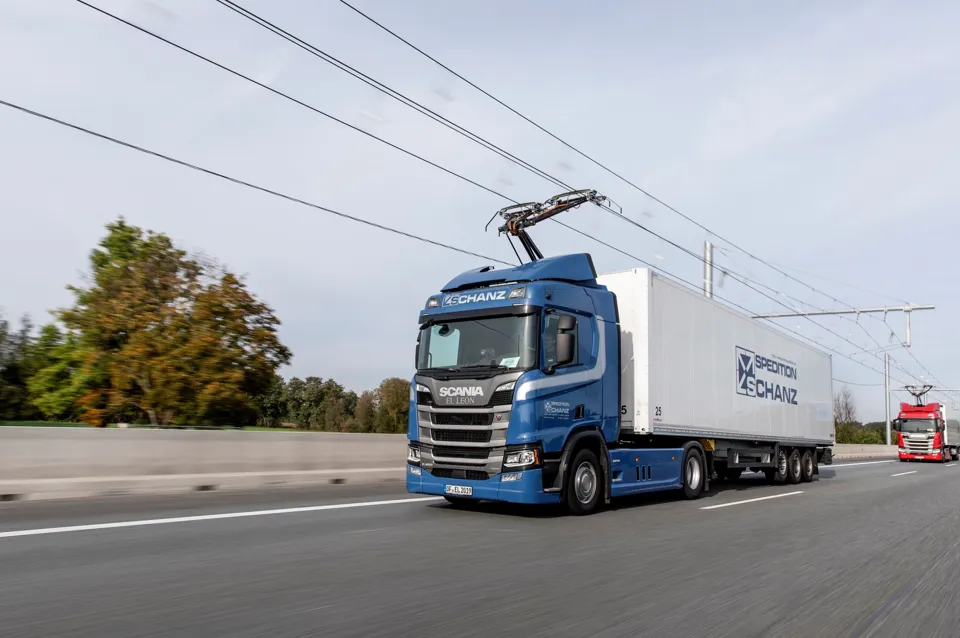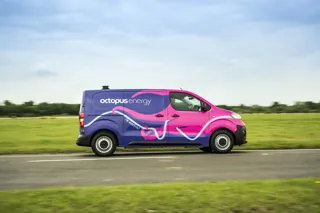Department for Transport (DfT) funding of £20 million has been announced to deliver a series of projects to help support the uptake of zero emission trucks.
Projects receiving a share of the funding include an ‘electric road system’ feasibility study involving a consortium led by Costain, which includes Scania and Siemens Mobility. It will be considering a 20-kilometre stretch of road near Scunthorpe for a possible trial of electric road systems.
They supply battery-electric trucks with electricity from overhead catenaries via a pantograph enabling HGVs to charge dynamically.
The trucks come equipped with a battery that charges while they are in motion so they can detach to both overtake vehicles and reach their final destination with zero emissions from start to finish.
The nine-month study starts this month and it is hoped to be the forerunner of a scheme that aims to see the UK’s major roads served by overhead lines by the 2030s.
James Armstrong, managing director for Scania (Great Britain), said: "Electrifying road freight is key in the UK’s journey to zero net emissions.
"We have been working with our partners to develop and mature electric road technologies and have demonstrated that they are not only viable but attractive, cost-effective alternatives to fossil fuel-based vehicles for our customers.
"This partnership is dedicated to marrying technical excellence with visionary ambition, which is how we will achieve a practical and affordable electric roads system for the freight and logistics industry."
William Wilson, CEO of Siemens Mobility, added: “Investing in proven technologies like eHighways can help us go further and faster to decarbonise the UK’s transport network, and support jobs and growth to level up the country.
“By building on successful trials from other countries like Germany, our ERS consortium M180 trial will help the UK move a step closer to replacing more polluting trucks with clean, efficient electric HGVs.”
Meanwhile, a hydrogen fuel cell feasibility study, led by Arcola Energy, will design a possible future trial of hydrogen fuel cell trucks and new refuelling infrastructure in Scotland.
Commercial vehicle manufacturing company Leyland Trucks will also be deploying 20 DAF battery-electric trucks for use by public sector organisations to test vehicles in a real-world, real-time logistics environment.
The funding announcement to help electrify heavy commercial vehicles, comes after the Government published its transport decarbonisation plan, which includes proposals to only allow the sale of zero-emission new heavy vans and trucks.
These projects, along with four other successful feasibility studies, aim to prepare for a potential demonstration of zero emission freight technologies at scale on UK roads and will support the rollout of zero emission technologies to decarbonise heavy transport vehicles, says DfT.
Transport secretary Grant Shapps said: “Through our bold and ambitious transport decarbonisation plan, we’re leading the way in the transition to zero emission vehicles by becoming the first country in the world to commit to ending the sale of all new fossil-fuelled road vehicles by 2040, subject to consultation.
“By working in partnership with industry, this funding will allow us to better understand the role of zero emission HGVs while levelling up the industry and boosting regional economies.”
Rob Lawton, project manager at Leyland Trucks, said that the business was delighted to have been selected to play a “key role” in the initiative.
“We’re proud to be leading the drive towards a cleaner, more sustainable future for the road transport industry,” he continued.
“We believe our LF Electric and CF Electric vehicles offer the best solution for zero-emissions operation and we’re confident that the results from our NHS and local authority partners will support our own extensive and long-term testing programmes.”
Meanwhile, Arcola Energy said that the hydrogen study would enable the company to expand the application of Arcola Energy’s A-Drive fuel cell powertrain platform to a “critical group” of HGV operators that can benefit from Scotland’s “strong potential” for green hydrogen production.
























Login to comment
Comments
No comments have been made yet.